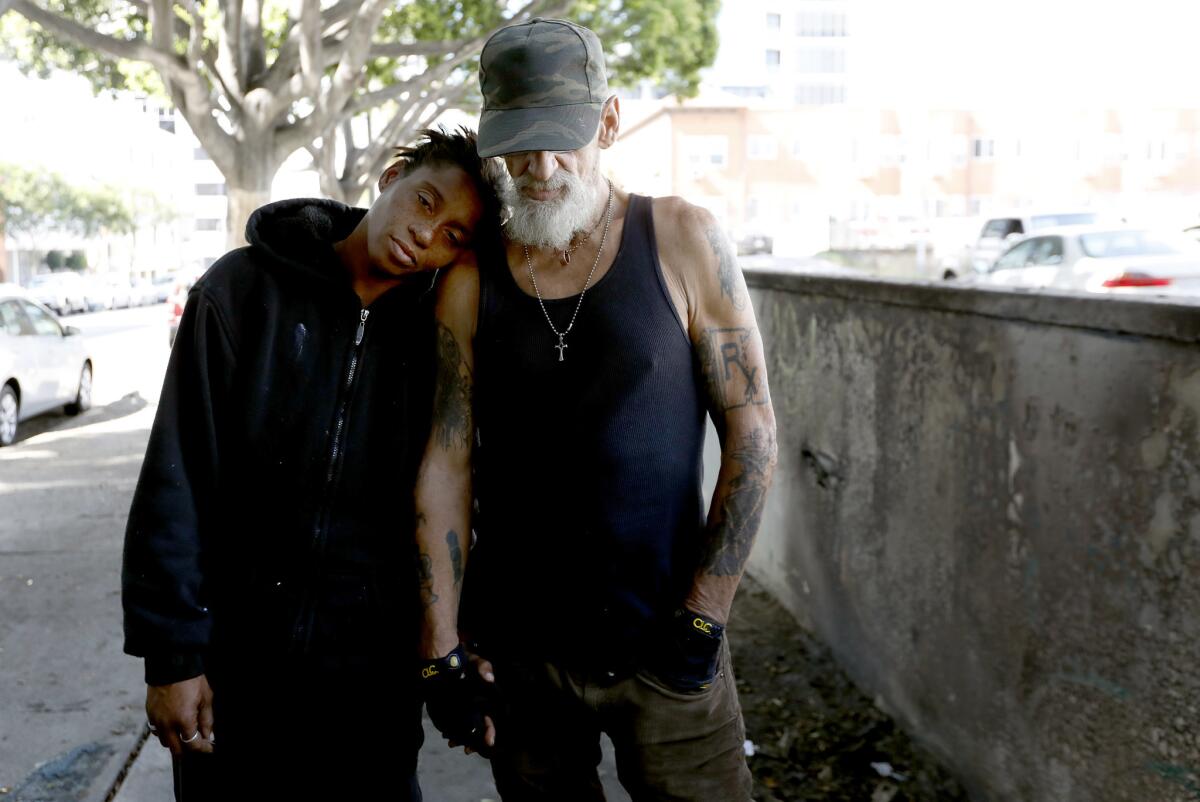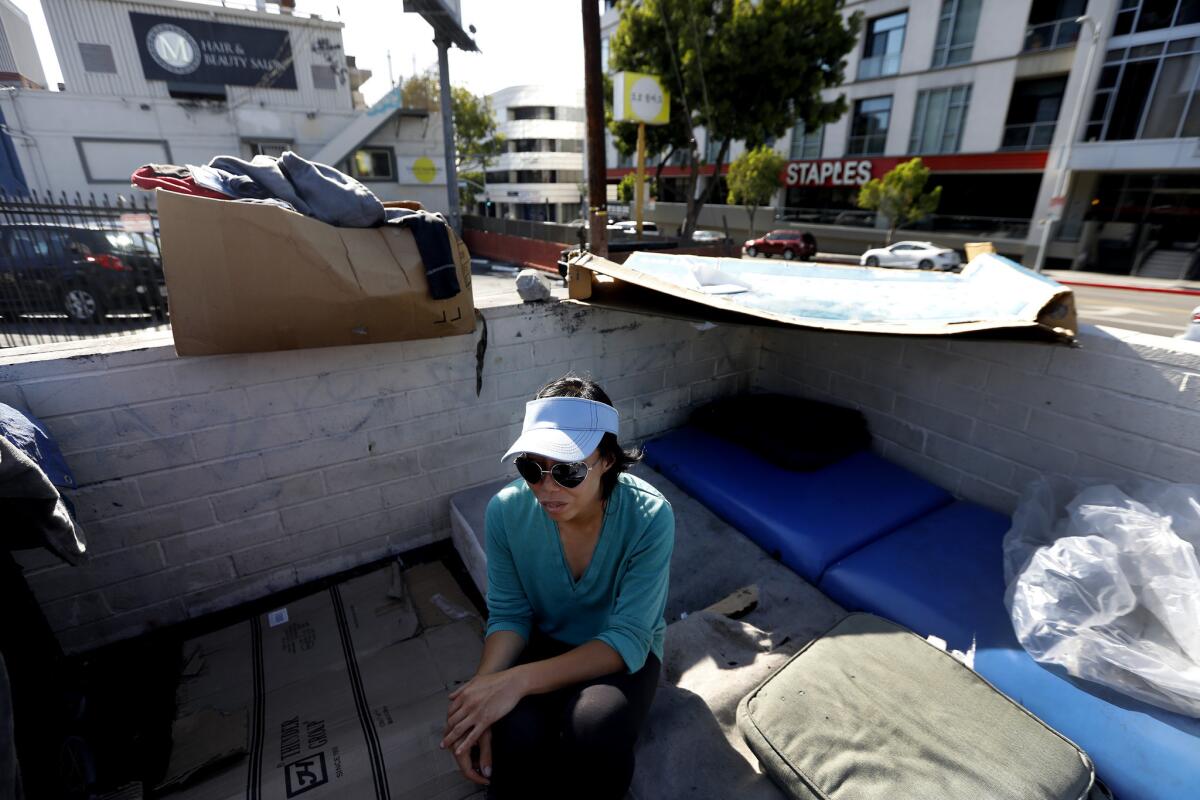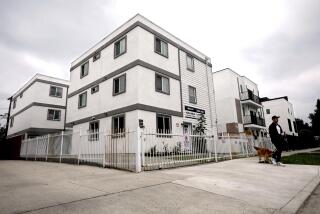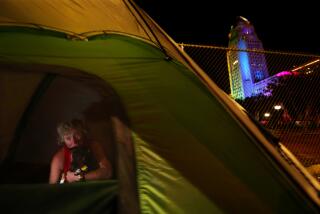Must Reads: Furor is mounting over proposed Koreatown shelter. Is it NIMBYism, or a community ‘blindsided’ by the city?

- Share via
The 62-year-old man with a scraggly beard and glasses poured water from a plastic jug onto a towel and began washing up for the new morning outside the tent he shares with his wife.
Koreatown’s been kind to him, said the man, who gave his name only as Tony but is known to most as “Maddogg.” Those who walk along this stretch of New Hampshire Avenue daily know he’s sick with colon cancer and ask how he’s feeling. Others come by with food. Once, a well-dressed man dropped a $100 bill in front of him. When Tony tried to return it to him, the man said it wasn’t his.
He returns the favor — keeping the block that he calls home meticulous, picking up around him every day.
“If we stay here,” he said, “we respect it and keep it clean.”
Mayor Eric Garcetti and City Council President Herb Wesson earlier this month chose a city-owned Koreatown parking lot, two blocks from where Tony has been living, to be the launch site for the mayor’s $20-million initiative for temporary homeless shelters across the city.
With about 400 people living on the streets and nearly 70 encampments, the need in Koreatown is pressing and palpable, Garcetti and Wesson said. The 65-bed shelter would be a “pathway” to getting people off the street while the city builds permanent housing, they said. One temporary shelter will be built in each of the 15 council districts.
But the decision to put the shelter near the corner of Wilshire Boulevard and Vermont Avenue, in the heart of Koreatown and within a short distance from several schools, has led to overwhelming opposition from residents and business owners that has caught city and community leaders by surprise.
Opponents accuse the city of having blindsided the community by choosing the site for the shelter and making the announcement with little input from those who live, work and run businesses there. They say they see the need, and agree there should be a shelter in Koreatown, but that the current site is unacceptable.
More than 8,000 people have signed an online petition opposing the plan, and hundreds have protested at two weekend rallies demanding the city relocate the shelter site. (A smaller group also staged a counter-protest expressing support.) Korean-language media have been lambasting the plan, calling it “an arbitrary decision by city government.” An anonymous donor cut a check for $20,000 to the Korean American Federation of Los Angeles to push back against it.
Many contend that the way the lot was selected and the decision announced was just the latest incident in the city’s long history of failing to include the Korean community in decisions affecting them.
“This is just one more time where the Korean community feels like it was just invisible,” said Emile Mack, vice president of the federation, which was inundated with calls and social media messages from those concerned about the shelter. “It was just, ‘Here’s the decision.’”
Mack and other community leaders who stood alongside Garcetti and Wesson when the announcement for the shelter was made said they weren’t given enough details about the proposal in advance, and that the city appeared to have finalized the plans before approaching them the week before.
This is just one more time where the Korean community feels like it was just invisible.
— Emile Mack, vice president, Korean American Federation of Los Angeles
Steve Kang, director of external affairs for the Koreatown Youth and Community Center, said the furor ignited in a grass-roots manner through online forums and social media networks.
“Unlike other big Koreatown issues, this one was very organic — young moms, young dads, grandparents, first and second generation, average ordinary folks,” he said.
Several organizers of the opposition drew comparisons to the 1992 riots, when the Korean American community felt abandoned and sidestepped by the city. One television spot by a Korean-language news station urging people to come out to this Saturday’s rally spliced footage from the post-riot peace rally with the previous weekend’s protest against the shelter. In the clips, Wesson can be heard saying that there would be no public hearing and Garcetti saying that the lot was city property.
“Because this crisis demands it,” Garcetti said of the shelter. ”And we own it.”
Faced with the uproar, Garcetti and Wesson, accompanied by Councilman David Ryu, a Korean American who has previously worked in the community, met with neighborhood groups and held a rare news conference specifically for the Korean-language media.

They acknowledged there could have been more outreach but said they did contact area businesses, schools, religious organizations and community groups to seek support before the public announcement.
They attempted to dispel notions that the shelter will result in blight and safety issues in the area, emphasizing there would be around-the-clock police presence and that they would be bringing those already sleeping on nearby streets to indoor beds where they can receive supportive services.
“No community ever has one voice,” Garcetti told the Korean media on the steps of City Hall. “Every community will always have voices that may have fear, and others that have hope.”
Wesson spokeswoman Vanessa Rodriguez said “more outreach could have been done,” but that given the limited options of city-owned property, the lot was the best location in an area of dire need.
“There may never be a perfect place, but this is pretty close,” she said. “It was about where there are the most of them, and how can we get them immediate services.”
The entreaties by city leaders have done little to assuage the ire.
Chan Yong Jeong, a Koreatown attorney, said he has filed a public records request for analyses, reports and email correspondence within City Hall regarding the shelter and its location.
He said he and others feared the shelter will result in a surge of homeless individuals who can’t all be accommodated by the 65 beds in what is a busy corridor central to Koreatown where schoolchildren often pass.
“This spot is the wrong place,” said Jeong, who passed out thousands of fliers urging residents to come out to a Saturday afternoon protest. “I don’t think there was a real impact analysis. Look at skid row downtown — they could not do anything about it for decades.”
Laura Jeon, president of the Korean American Federation, said much of the outrage comes from a history of feeling that the community has no voice in city matters.
“There’s distrust in governmental authority and City Hall from the riots. The hurt, the memory runs too deep,” she said. “We haven’t seen this kind of united anger and outrage since the riots.”
One community organization, the Korean Resource Center, expressed full support for the shelter.
It could be just the luck of the draw. Why wouldn’t they want to help?
— Raymond Hunter, homeless Koreatown resident
David K. Song, chair of its board of directors and an 18-year Koreatown resident, said the vocal opponents didn’t speak for everyone in the community. He said he sees the need every day on the streets around him, when he walks his daughter to day care or takes a stroll with his son.
“You’re assuming the worst. It’s not that just because they’re there, they’ll be a threat,” he said. “It makes sense to have it in that area for a while.”
Tony, the Koreatown tent dweller, hadn’t heard of the proposed shelter or the uproar over it. He had more pressing matters, like sorting out his health insurance.
Raymond Hunter, 38, has been staying next door to Tony and his wife in a smaller tent. He said he liked Koreatown for its diversity and energy. “Nobody feels like the king of this place,” he said.
He said a shelter would go a long way to help, especially now that motel vouchers for the homeless had dried up. He said it was the first time in his life that he was living on the street and hoped others could see that the same could happen to them.
“It could be just the luck of the draw,” he said. “Why wouldn’t they want to help?”
For more California news, follow me on Twitter @vicjkim
More to Read
Sign up for Essential California
The most important California stories and recommendations in your inbox every morning.
You may occasionally receive promotional content from the Los Angeles Times.











